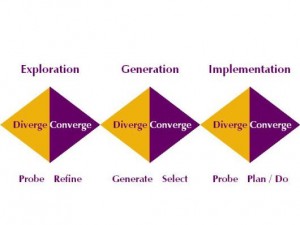Do Not Fight in “Dispersive Ground”:
Advice from Sun Tzu’s The Art of War
Sun Tzu’s The Art of War: Advice for Authors and Entrepreneurs
In The Art of War, Sun Tzu identified nine varieties of ground.
How does that help us in our book or product marketing campaign?
Especially, how does that help us when our “campaign ground” is not the physical terrain of mountains, rivers, and plains – but the “infosphere” – all the material available on the internet?
Planning Ahead: A Small Fish Now, a Big Fish Later

Forever a small fish facing the big fish? Sun Tzu’s advice can help you take the right marketing strategy.
I recently came across an ebook written by a fellow author.
Her intent was to advise other authors on how to accomplish what she’d done, which was to sell a few thousand copies of each of her books.
With some eagerness, I downloaded her book and began to read.
Of course, she had some useful and interesting ideas.
And of course, she mentioned some points that are (or at least should be) well-known to all authors.
The more that I read, though, the more I had this sinking feeling.
You know – that Oh, no! feeling that you get when you see something going very much off course.
Or even worse, going down.
What’s Wrong with Selling a Few Thousand Copies?
Now, there’s nothing wrong with selling a few thousand book copies.
Selling thousands of books should indeed happen.

Linda Weintraub and Heidi Leugers selling books to conference attendees, and promoting “eco-friendly book publishing.” (Note that these two are NOT the authors of the ebook which is the discussion starting point for this blog – and that I DO recommend their blogpost and publishing avenues.)
Ideally, selling thousands happens on the way to selling tens of thousands – then hundreds of thousands – then millions of copies.
The problem?
The strategy that works to sell a few thousand books is counter-productive for selling tens of thousands and more.
Even when someone knows that a strategy is yields only short-term results, that doesn’t always motivate them to seek out and adopt a productive long-term strategy.
The “e-book strategy” author wrote:
I should update my blog more, I know. The truth is, I’d rather be writing for publication.
She then went on to list – in alphabetical order – about three dozen distinct strategies. Each strategy included multiple tactical steps – sometimes up to two dozen tactical “movements” – connections with distinct organizations that would be “good contacts” for publicity/promotion.
Each, of course, would take time.
A Horrible Lesson
If you can’t be a good example, then be a horrible lesson.
In a certain start-up company, one of the founding partners was a great marketer. He was great for getting visibility, and for advancing the early launch.
The problem came when he actually got some funding. Three years later, the investors had to “pull the plug” on him. They replaced him with a different CEO.
So the question is:
Do you want to be the CEO who launches the company, but is derailed shortly after? Or do you want to be the CEO who rides the waves to success?
Totally different strategies are needed.
A Strategy That Doesn’t Work (for the Long Run)
The author who wrote the e-book on how to “successfully market” books described her “success” as a result of steps such as:
- Going to book expos, special-interest conventions, and other “meet-the-reader” venues,
- Participating in online book forums and chat rooms, and
- Listing her book on e-bay with the “right keywords.”
And of course, she took many, many more actions as well.
Note that this is just a sampling of the strategies and tactics that she’s tried and has listed.

Too many directions at once – divergent marketing – puts you on what Sun Tzu called “dispersive ground.”
What’s wrong?
Individually, not one.
However, taken together, they are dispersive.
They send the author/marketing team (usually one and the same) in multiple directions.
What’s worse?
These various directions never converge back – they never bring people back to the author in a long-lasting, mutually-beneficial relationship.
In short, they don’t build tribe.
What the ebook author didn’t identify was a strategy based on Sun Tzu’s The Art of War.
How Would Sun Tzu Describe This Situation?
Sun Tzu, in The Art of War, wrote (in Chapter XI, on “The Nine Varieties of Ground”):
When a feudal lord fights in his own territory, he is in dispersive ground.
The commentary from Ts’ao Ts’ao was:
Here officers and men long to return to their nearby homes.
We make the analogy:
“Dispersive ground” is a form of terrain (mind-map) in which your troops (your ideas, via your products and platform) are competing with many similar ideas. When your ideas are too close to what is safe, known, and familiar (their “nearby homes”), they will drift due to distracting forces.
An example of “dispersive ground” would be selling your book at a book conference devoted to the same theme as your book topic (gardening, science fiction, business leadership, etc.)
Your ideas become “dispersed” when they are too similar to – and not differentiated from – related ideas and offerings.
So the question becomes:
How do you get off dispersive ground and get into more useful terrain?
Sun Tzu’s Advice: “Do Not Fight in Dispersive Ground”
In The Art of War (Chapter XI), Sun Tzu identifies nine varieties of ground. One of these is “dispersive.”
Sun Tzu advises:
… do not fight in dispersive ground (Sent. 11) … in dispersive ground I would unify the determination of my army. (Sent. 15)
If you’re in a situation in which your ideas are becoming diffuse; if they are starting to “drift” in the minds of your readers – so that your readers are returning to what is safe, known, and familiar (their “nearby homes”), you have to “unify the determination” of your army.
That means: get absolute clarity on your unique selling proposition (USP). Be clear about what you offer that distinguishes your work from others.
Also, begin to control the “drift” of people’s minds.
If they just touch on your work by chance – if they meet you at an expo or conference or networking meeting, or if they just come across your website – then you don’t have enough leverage to keep and focus their attention.
Specific Actions and Desired Outcomes

Start bringing people into alignment with your vision. Sun Tzu would call this “unifying the determination” of your army.
To get off “dispersive ground,” you need to bring people into your tribe:
- Get people to Opt-In to your website/blog with a uniquely valuable offer.
- Follow up with emails and direct them to your blogs, consistently providing them with superior value and educating them.
- Encourage people to adopt and apply your language, your concepts, and your uniquely helpful insights – which will happen naturally over time.
How will you know if you’re succeeding? Look for key indicators – people will:
- Use your terminology – your “language” – you’ll observe that the terms and metaphors that you’ve coined to help teach others will start showing up in their own teachings and writings,
- Link back to your website – people will take pride in referencing you as their “point of authority.”
- Promote your work – without you having to “push” out your work all the time, others will quote you, link back to your blog on theirs, “share” what you post on social media, and let others know about your upcoming workshops and new product releases.
Signs such as these let you know that you are “unifying the determination of your army,” because your army consists of your unique insights, thoughts and ideas – all the different but related teachings that you offer as a thought-leader.
A Very Important Point
People themselves are not your army. (You’re not putting 100,000 soldiers and chariot-drivers into the field.)
Your army is your thoughts and ideas, your unique insights that differentiate you.
However, people will join you emotionally and intellectually – this is when you gain terrain. At this stage, you are a thought-leader with an established platform and multiple products (books, e-books, instructional programs, etc.). People will be identify themselves with you; this is represented in your combined sales, and in your ever-growing Opt-In List.
P.S. “Dispersive thinking” is not always bad.

Management consultant Jim Yates advocates both convergent and divergent thinking.
There are times that you will need to be “dispersive” – to investigate new grounds, to create new alliances, to spread the word.
However, always do this with a view in mind to bringing people back to you – to go from your dispersive outreach to your convergent attraction.





